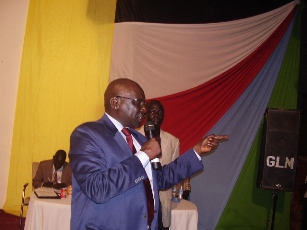S. Sudan rebels describe army chief’s confession as “arrogant truth”
July 24, 2014 (ADDIS ABABA) – The South Sudanese rebel faction led by former vice-president Riek Machar said they were not surprised by the recent confession by the army’s chief of general staff, Gen. Paul Malong Awan, who admitted for the first time that government troops were responsible for renewed violence in the country in violation of a cessation of hostilities agreement.

Rebels and government officials at the time of the renewed violence in the three states of Unity, Jonglei and Upper Nile exchanged accusations over who violated the agreement.
The South Sudanese army chief, at a press conference he conducted on Monday in the capital, Juba, said that attacks by government troops on the rebel positions before the 9 May agreement between president Salva Kiir and Machar were deliberately “calculated” to gain ground prior to the signing of the deal.
However, the SPLM opposition group said they were not surprised by the confession that the government was in fact responsible for the violations.
“We are not surprised by this arrogant, but truthful confession,” said Machar’s spokesperson, James Gatdet Dak.
He said the government had been violating 23 January cessation of hostilities agreement since the day it was signed, adding that “the international community has to learn something from this late admission.”
UGANDA PROTRACTED WAR
Speaking on condition of anonymity because he was not authorized to talk with the press, another senior rebel official claimed that South Sudanese army backed by tribal militias, were defeated by their fighters within weeks from 15 December crisis until Ugandan army came in with overwhelming air power against them.
“Juba was within our reach a few weeks from the start of the crisis. We captured Bor, Bentiu and Malakal,” the official said, referring to the capitals of Jonglei, Unity and Upper Nile states, respectively.
“We were neutralizing thousands of government troops on Juba-Bor road, and we were marching toward Juba without a significant resistance after we captured Bor,” he said.
The rebel official however admitted that the “fiercest” battle that stopped the rebels in January and forced them to withdraw 90kms from Juba was with Ugandan forces near Mangala town in Central Equatoria state.
“Uganda army then came in with dozens of tanks, other armoured vehicles and thousands of ground troops backed by six helicopter gunships. The six helicopter gunships carried out bombings against our fighters simultaneously for nine hours of the battle until our forces decided to withdraw,” he revealed.
“We have courageous fighters but lack modern war equipments,” he said.
REBELS USE SPEED AND PROXIMITY
Rebels revealed because they only had AK-47 rifles and didn’t have anti-aircraft or anti-tank missiles and other heavy artilleries they were forced to operate according to an unusual strategy, running straight toward the enemies, and overwhelm them with speed and proximity.
“We didn’t have weapons to bring down a helicopter gunship or destroy a tank. In order to avoid firepower from heavy artilleries hitting us from a distance, our fighters tactically used speed and proximity.
He said rebel fighters always preferred to fight government troops within close ranges of only about 10 meters apart, dislodge them and chase the enemy at that very close distance.
The tanks and other heavy weapons used by government forces, he said, were always left with no option but to either surrender or run without shooting because they couldn’t tell who was who in the battle fields.
He however said the rebel fighters got a challenge when Ugandan helicopter gunships began to drop overwhelming firepower targeting them tens or hundreds of kilometres away from enemy positions.
(ST)
